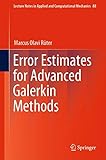Error Estimates for Advanced Galerkin Methods [electronic resource] / by Marcus Olavi Rüter.
By: Rüter, Marcus Olavi [author.] .
.
Contributor(s): SpringerLink (Online service) .
.
Material type:  BookSeries: Lecture Notes in Applied and Computational Mechanics: 88Publisher: Cham : Springer International Publishing : Imprint: Springer, 2019Edition: 1st ed. 2019.Description: XIV, 496 p. 766 illus., 179 illus. in color. online resource.Content type: text Media type: computer Carrier type: online resourceISBN: 9783030061739.Subject(s): Mechanics, Applied
BookSeries: Lecture Notes in Applied and Computational Mechanics: 88Publisher: Cham : Springer International Publishing : Imprint: Springer, 2019Edition: 1st ed. 2019.Description: XIV, 496 p. 766 illus., 179 illus. in color. online resource.Content type: text Media type: computer Carrier type: online resourceISBN: 9783030061739.Subject(s): Mechanics, AppliedIntroduction -- Newtonian and Eshelbian Mechanics -- Boundary Value Problems -- Galerkin Methods -- Numerical Integration -- Energy Norm A Posteriori Error Estimates -- Goal-oriented A Posteriori Error Estimates in Linearized Elasticity -- Goal-oriented A Posteriori Error Estimates in Finite Hyperelasticity -- Numerical Examples -- The Nonstandard Dyadic Product Operators -- Push-forward and Pull-back Operations -- Tensor derivatives -- A Generalized Nitsche Method -- The J-integral in Elastic FractureMechanics -- Linearizations -- Materials investigated in this monograph -- Functional Analysis—A Synopsis.
This monograph provides a compendium of established and novel error estimation procedures applied in the field of Computational Mechanics. It also includes detailed derivations of these procedures to offer insights into the concepts used to control the errors obtained from employing Galerkin methods in finite and linearized hyperelasticity. The Galerkin methods introduced are considered advanced methods because they remedy certain shortcomings of the well-established finite element method, which is the archetypal Galerkin (mesh-based) method. In particular, this monograph focuses on the systematical derivation of the shape functions used to construct both Galerkin mesh-based and meshfree methods. The mesh-based methods considered are the (conventional) displacement-based, (dual-)mixed, smoothed, and extended finite element methods. In addition, it introduces the element-free Galerkin and reproducing kernel particle methods as representatives of a class of Galerkin meshfree methods. Including illustrative numerical examples relevant to engineering with an emphasis on elastic fracture mechanics problems, this monograph is intended for students, researchers, and practitioners aiming to increase the reliability of their numerical simulations and wanting to better grasp the concepts of Galerkin methods and associated error estimation procedures.


There are no comments for this item.